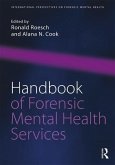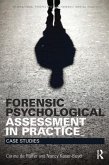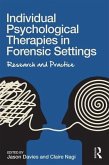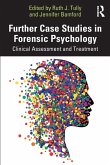This book describes targeted therapeutic interventions, programmatic approaches, and system-wide transformations of forensic mental health services.
Interventions include creative applications of a variety of multidimensional and theoretically grounded approaches. These include variations of cognitive-behavioral therapy (CBT), dialectical behavior therapy (DBT), psychodynamic, psychosocial, Risk-Needs-Recovery (RNR) and Good Lives Models, and other approaches. Contributors from several countries address key topics such as aggression, sexual violence, substance use, trauma-informed care, competency restoration, and other specialized treatment areas. Clinical examples are included throughout, which include current data and research and suggestions for further research for use by clinicians working in a range of settings with a variety of treatment population subsets.
This book is essential for administrators and clinicians seeking effective and state-of-the-art approaches.
Interventions include creative applications of a variety of multidimensional and theoretically grounded approaches. These include variations of cognitive-behavioral therapy (CBT), dialectical behavior therapy (DBT), psychodynamic, psychosocial, Risk-Needs-Recovery (RNR) and Good Lives Models, and other approaches. Contributors from several countries address key topics such as aggression, sexual violence, substance use, trauma-informed care, competency restoration, and other specialized treatment areas. Clinical examples are included throughout, which include current data and research and suggestions for further research for use by clinicians working in a range of settings with a variety of treatment population subsets.
This book is essential for administrators and clinicians seeking effective and state-of-the-art approaches.
"The chapter authors review structured programs for forensic populations, ranging from adults and juveniles who have committed sexual aggression, to substance abusers, to psychotic individuals who have committed violent crimes. I recommend this book for anyone interested in practical, hands-on lessons from experienced practitioners who are on the front lines of treatment for these challenging cases."
Philip H. Witt, Ph.D., A.B.P.P. (forensic), Somerset Psychological Group, USA
"Innovative Treatment Approaches represents a powerful tool for exploring creative, empirically grounded psychotherapeutic treatments within correctional settings. Timely and cutting edge, Siglag's edited text deftly informs those working directly or indirectly in such settings. Beyond being a mere white paper for programmatic issues or boilerplate psychotherapy protocols, the contributing authors provide rich theoretical, empirical, and clinical data aimed to assist those clinicians in the trenches of correctional consulting rooms. This collection of scholars address the range of clinical and practical needs of correctional facility patients as well as the needs of those tasked with the challenging yet meaningful need to treat. I contend that Innovative Treatment Approaches is a useful book for anyone working in correctional settings."
Anthony F. Tasso, Ph.D., ABPP, Professor of Psychology and Deputy Director of the School of Psychology & Counseling, Fairleigh Dickinson University, USA
Philip H. Witt, Ph.D., A.B.P.P. (forensic), Somerset Psychological Group, USA
"Innovative Treatment Approaches represents a powerful tool for exploring creative, empirically grounded psychotherapeutic treatments within correctional settings. Timely and cutting edge, Siglag's edited text deftly informs those working directly or indirectly in such settings. Beyond being a mere white paper for programmatic issues or boilerplate psychotherapy protocols, the contributing authors provide rich theoretical, empirical, and clinical data aimed to assist those clinicians in the trenches of correctional consulting rooms. This collection of scholars address the range of clinical and practical needs of correctional facility patients as well as the needs of those tasked with the challenging yet meaningful need to treat. I contend that Innovative Treatment Approaches is a useful book for anyone working in correctional settings."
Anthony F. Tasso, Ph.D., ABPP, Professor of Psychology and Deputy Director of the School of Psychology & Counseling, Fairleigh Dickinson University, USA









